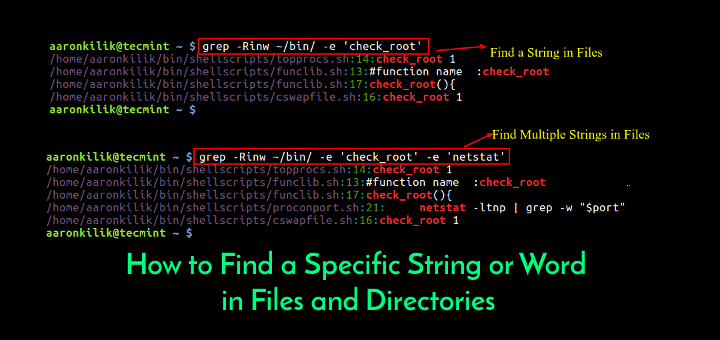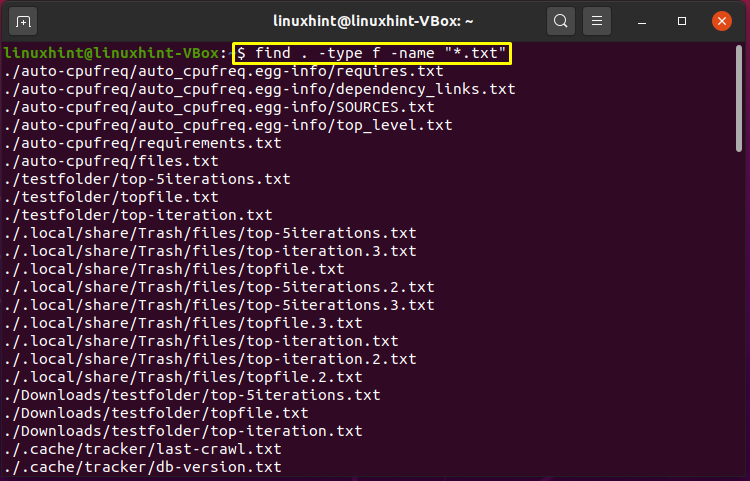
- #How to search multiple files in unix using one command how to#
- #How to search multiple files in unix using one command code#
- #How to search multiple files in unix using one command windows#
This should copy all of the files that are listed from the source directory to the destination directory with duplicates taking the format pic(1).jpg, pic(2).jpg and so on.įile.txt should be a file that lists all the pictures you would like to copy with each entry on its own separate line. Then cd to your home directory (or whatever directory you saved move.py in) from the terminal and type the following command: python move.py /path/to/src/ /path/to/dst/ file.txt
#How to search multiple files in unix using one command code#
First off, copy the above code into the program gedit (should be pre-installed in Ubuntu) or any other text editor.Īfter that is complete, save the file as move.py in your home directory (it can be any directory but for ease of instruction lets just use the home directory) or add the directory the file is contained in to your PATH. This script should be relatively simple to use. #returns list with each line of the file being an element of the listĬontent = Ĭopy_files(src,dst,read_file(file_with_list)) #reads each line of file (f), strips out extra whitespace and Raw_input("Please, press enter to continue.") Renamed = "%s(%d)%s" % (file_prefix,num,exstension) (file_prefix, exstension) = os.path.splitext(file_name) #splits file name to add number distinction
#How to search multiple files in unix using one command how to#
However, I am not sure how well versed you are in python (if versed at all) so I will try explaining how to use this script the best I can and please ask as many questions about it as you need. So I wrote a little python script that I believe should get the job done. If that is the case let me know and i'll edit my answer. Where file1,file2,file3 and file4 would be copied.įrom how you worded the question I believe this is what you're looking for but it also sounds like you might be looking for a command to read from a list of files and copy all of them to a certain directory. The easiest I have seen is to use the following. There are several ways you could achieve this.
#How to search multiple files in unix using one command windows#
This is because /l*/ means ‘ match letter l zero or more times‘, so /l*c/ means ‘ match letter c preceded by zero or more occurrences of letter l‘, but any line that contains the letter c in it also contain zero or more letters l in front of it - the key to understanding this is “ ZERO or more times“.ĬONCLUSION: In REGEXP the asterisk symbol (*) does not mean the same thing as in Microsoft Windows and DOS/CMD file-name matching, it does not match any character (as this tutorial erroneously suggests), it matches the preceding character ZERO or more times.Simply copy multiple files at once from command line The above will match all lines that contain the letter ‘c’ regardless whether they contain the letter ‘l’ or not.

The example below prints all the lines in the file /etc/hosts since no pattern is given. In the following examples, we shall focus on the meta characters that we discussed above under the features of awk. The 'script' is in the form '/pattern/ action' where pattern is a regular expression and the action is what awk will do when it finds the given pattern in a line. This is repeated on all the lines in the file. It works by reading a given line in the file, makes a copy of the line and then executes the script on the line. Where 'script' is a set of commands that are understood by awk and are execute on file, filename.

The general syntax of awk is: # awk 'script' filename But for the scope of this guide to using awk, we shall cover it as a simple command line filtering tool. You can think of awk as a programming language of its own. In order to filter text, one has to use a text filtering tool such as awk.

One of the most important things about regular expressions is that they allow you to filter the output of a command or file, edit a section of a text or configuration file and so on. Read Also: 10 Useful Linux Chaining Operators with Practical Examples What are Regular Expressions?Ī regular expression can be defined as a strings that represent several sequence of characters.

This is where using regular expressions comes in handy. When we run certain commands in Unix/Linux to read or edit text from a string or file, we most times try to filter output to a given section of interest.


 0 kommentar(er)
0 kommentar(er)
